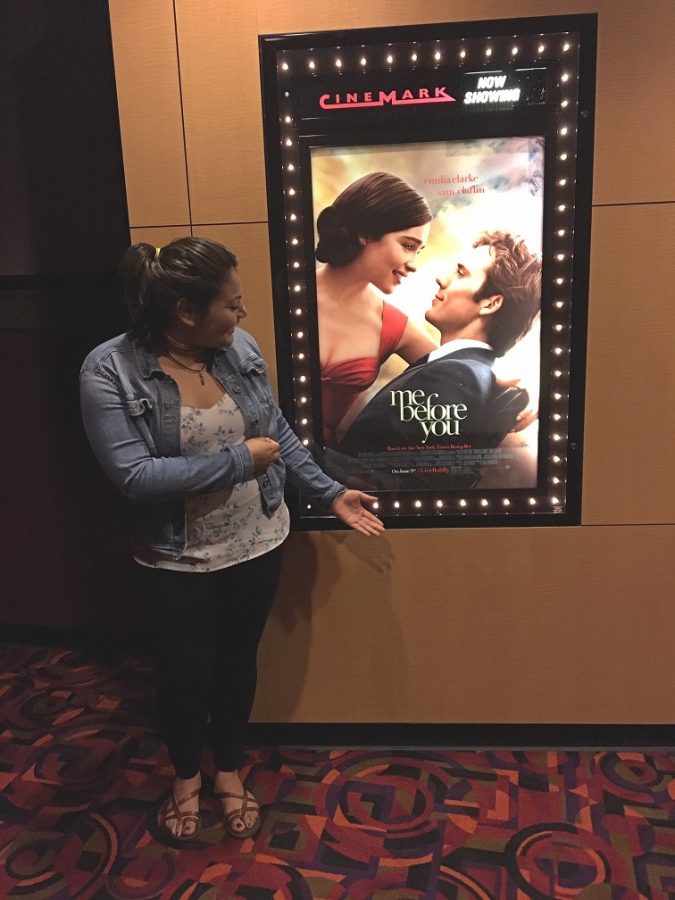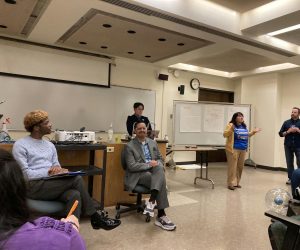‘Me Before You’: When Love is Actually Being Selfish
Love, heartache and sacrifice are themes that both the book and movie have in common.
June 21, 2016
As Louisa Clark (Emilia Clarke) scurries away from William Traynor—played by the yummy Sam Claflin—while accusing him of being selfish as he chooses to die rather than live happily with her, caused me to wonder if she was the one being selfish. Her beautiful, tear-stained face looked hopelessly upon Will; the sea behind her—its waves rushing onto the beach—as he tells her that “nothing would have changed [his] mind,” but the last few months he had to live were filled with joy … thanks to Louisa. Instead of trying to see the pain embedded in his very existence, Louisa marched off further away, leaving wheelchaired Will to fend for himself.
Being a romance/drama fanatic, I had already read the book written by Jojo Moyes. While I do admit that Louisa, our heroine, drove me crazy with her constant babble and clumsiness in the book, her wit and innocent view of her world caused me to warm up to her. The same innocence was portrayed in the movie, but it wasn’t as endearing since four very important details were exclusively bypassed:
Louisa Clark was sexually assaulted as a child in a maze on the castle’s ground which was not depicted in the movie and that disappointed me because I felt it was essential to understand Louisa as the person she is. In the book, Will was showing Louisa his family’s castle, and encouraged her to go into the maze, not knowing Louisa was traumatized in it. As she tried to find her way out, she had a nervous breakdown. Will eventually found her, and gently soothed her as he showed her the way out of the maze. The first time I read this whole passage, I was crying right along with Lou.
Here’s a woman trying to support her family, since her father is unemployed and her sister’s too selfish to get a better paying job, and she’s strong enough to live every day with the memory of her sexual assault without any outside help.
Knowing this, I felt a strong compassion and sympathy for her. This was one of the reasons why I understood Louisa’s decision to work at a job she’s not qualified to do; for me, her clumsiness towards Will’s care was almost forgivable, since she was trying to overcome the trauma she endured on those castle’s grounds. The subplots of her sexual assaults were important in order to understand Louisa better.
In the movie, the audience simply saw a woman working hard to support her family. In the book, I felt a deep sympathy for a traumatized woman fighting off her demons as she battles to overcome them, while still earning enough to support her family. This left-out information was what caused me to connect more with Louisa, made her seem more like a hero.
Another thing that did not transfer into the movie, was how much of an jerk Patrick really was. Throughout the whole movie, Patrick was perceived as this sweet, slightly-obsessed-with-exercising-but-still-a-devoted-boyfriend kind of guy, when in reality, he sexually assaulted Louisa as soon as he felt like she was slipping away from his emotional hold. The reason why this bothered me so much is because Moyes had a golden opportunity to briefly demonstrate that women still have the option to say “no” even in a relationship, even if it’s with your boyfriend.
Not many people understand that concept, that a girlfriend could still get raped by her boyfriend, regardless of their sexual history. I personally have friends that silently confessed to me that they didn’t want to be intimate with their partners, but haven’t said anything to anyone else for fear of humiliation and rejection. It angers me that Moyes, along with the Thea Sharrock (the director of ‘Me Before You’)—being women—did not take a few seconds to advocate against sexual assault. Without this information, Louisa lost a bit of my compassion for her, since she mainly looked like a “cheating girlfriend,” while Patrick’s heart was torn apart as she broke up with him.
The third detail not shown in the movie was Louisa’s incompetence as a caregiver for a person suffering from a spinal injury. Will was paralyzed from the chest down, causing him to take a vast amount of different medications to have his body functioning the bare minimum. Louisa was careless, neglectful, and reckless when taking care of Will, but this treatment was not transferred into the movie.
For example, during Will’s ex-girlfriend’s wedding, Louisa was getting bat-shit drunk. Sure, it seemed fun to dance on Will’s lap and throw all caution to the wind, but her first priority should have been to take care of Will, to tend to his needs. SHE IS HIS CARE-TAKER AFTER ALL. As a result of her drunkenness, Louisa did not change Will’s tube, causing him a great deal of discomfort. Her inadequacy wasn’t highlighted in the movie, but was pretty evident in the book, and I feel that’s because the director was trying to just focus on the falling-in-love bits.
The scene I absolutely hated was when Will, Louisa, and Nathan came back from their trip—towards the end of the movie—and Louisa excused herself from having lunch with the Traynors. Will begged Louisa to stay and join them, for her to understand why he’s choosing to die a peaceful death rather than keep on living in overwhelming pain. Yet she runs away instead. The audience in the movie theater didn’t get to see this heartbreaking scene—but instead saw Will indignantly say “let her go,” as Louisa escaped.
From forgiving and loving Will to giving him the cold-shoulder attitude, this slight alteration of dialogue stripped away the whole-hearted goodness and love Will felt for Louisa. This scene focused too much on her feelings, rather than Will’s very difficult decision to proceed with euthanasia.
The whole movie kept on bypassing the subject of euthanasia, and whether or not a human being has the choice of deciding for themselves whether to live or die! In the book, Will talks about the politics surrounding his decision, Louisa wonders if Will truly has the choice of deciding his own fate, and Will’s own sister (who didn’t exist in the movie) struggles to cope with his decision, but sadly, all of this was not transferred into the movie!
The audience would have been able to see Will’s internal struggle to either live with Louisa while in excruciating pain, or die after experiencing six months of happiness with her.
In my perspective, this story was meant to be about a woman falling in love with a man who has chosen euthanasia long before she ever crossed his path. It was meant to be about the complicated decision of a young man to pick his death over someone he loves. The movie should have been more focused on Will, rather than Louisa.
All in all, for you hopeless romantics that are not as picky with details and layers, ‘Me Before You’ is a good distraction from everyday life, but be warned that the movie is but a shell of the book.








